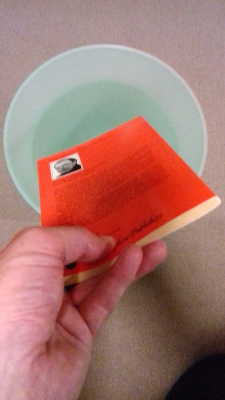On re-reading an old book

When I have finished writing this, I shall gently drop a book in my recycling bin, although destroying books goes against all my instincts. It isn't that it is a particularly bad book (although, on re-reading it 35 years after its composition, I can say that it hasn't worn terribly well). It isn't that it is a dangerous or corrupting book (although there are one or two points where, knowing what we know now, the reader may wince). It is simply that it has become untrustworthy, something I wouldn't put into the hands of its intended audience - young people asking questions about the Church and their Catholic faith.
The untrustworthiness resides not between the book's covers but in the name of the author, whom I recognised in the recent report of the Independent Inquiry Into Child Sexual Abuse (IICSA) into Ampleforth and Downside.
He was never prosecuted, but did accept a police caution for a long-term relationship with a vulnerable adult, of whose parents he was a friend, and other disturbing elements in his record are also chronicled by IICSA. He quietly left his monastery, only to return in a coffin for a discreet burial nearly a decade later.
Back in the 1980s he wrote a slim volume, scarcely 70 pages of text, framed in terms of the questions that young people had reportedly asked him in the previous couple of years. Having last read it shortly after its first publication, I picked the book up again looking for clues. How did this charming man, who was to some degree a mentor for me, come to have such a dark side? How did he come to betray our expectations - or was it our expectations that were at fault?
Perhaps it's significant that his opening gambit in the book was to talk about 'Feeling Useless' and young people's frequent struggles with self-worth. Not that I have any evidence that he was rampantly predatory, but it is in working with the most vulnerable that the pastor has to be most aware of his or her own desires and needs and most strongly patrol personal boundaries. Somehow he crossed that terrible Rubicon, for several years, and that with a young woman doubly deserving of his care, as a family friend. 20 years after he first assaulted her he was found to have broken school policy by providing pupils with alcohol. IICSA makes no suggestion that anything illegal ensued but again it bespeaks smudged boundaries, as did his Facebook page until it was shut down.
The best clue in the book as to what went wrong in his ministry comes in his almost total lack of self-disclosure within all the chatty discussions contained therein. My own little adage is that if you can't share yourself you can't share faith, yet there is no (appropriate) sharing of experience here. There is not a word about the value of celibacy. You would never guess that he was a monk from his text.
There is no mention of St Benedict, nor of the position of the now-questionable figure of the all-powerful 'Father Abbot' in the monastic menagerie. The final chapter on prayer, which ought to be the real expertise of the monk, is really rather thin gruel, petering out in an invitation "to support your prayer with the prayer Jesus taught us: 'thy will be done'." And one of the few truly autobiographical sentences in the book states that his teenage memories are "of struggles in backs of cars, trying to get bras off girls." Troubling … and presumably brief in duration, since he went (if I remember correctly) straight from school to monastery, via A Benedictine-run house at Oxbridge: not perhaps the best route to psycho-sexual maturity.
I have my doubts as to how many young Catholics, even back in the 1980s, were really asking quite the questions his little work addresses, about the Church, the Pope, the Cardinals and Bishops, the Mass, Confession or Confirmation, though safe discussions of such topics were probably still common offerings in chaplaincies up and down the land. The answers are a little too ecclesiastical, a little too 'Vatican II Revisited', to sound like a real dialogue with twenty-year-olds. But, all things being equal, there would be little to question here. Except that we are sensitised by knowing the charge against him. A priest in confession will be "a real sort of soul friend, someone you can trust and with whom you can be completely open and honest …" And on the next page a jokey illustration shows two pairs of eyes in a black cloud with the caption, "Some people still prefer the anonymity of the confessional box." Unfortunate in the circumstances, you might conclude.
However, it's in the chapter about sex (subtitle: "Father, I have a problem …") that real feelings of discomfort rise. Shall we say that the 'How Far Can You Go?' line of inquiry lacks the levity of David Lodge? No mention, of course, of the possibility of same-sex attraction (this was the '80s, after all, and it was written for good Catholics!). But did youngsters really want to hear clerical views on the rightness of fondling a girl's breast, slipping a hand between her thighs, mutual masturbation or other ways of not-quite-having-sex? When does being approachable and unembarrassed about sex tip over into being inappropriate and downright excruciating?
In the 1980s, at the height of Pope John Paul II's pomp, perhaps it felt normal for members of the clergy to wax lyrical about contraception (as this Benedictine does for six pages near the end of his little book, albeit compassionately enough). Now it just feels weird. Twenty years of sexual scandals, combined with broader processes of secularisation and a more articulate and self-confident laity, have silenced us clergy on the subject, perhaps for good and probably for the greater good. Now we must leave it to the experts, people who live the joys and sorrows of human sexual intimacy.
It is not that I want to judge my old guide. I know only the sparse details given in the IICSA report. I do not need even to have an opinion as to his motivations or his degree of personal responsibility. I have no reason to deny that there is some good advice in his text. Nor do I need to stop feeling a certain gratitude for his place in my own muddled journey through my twenties. I just wish I understood what went wrong on his journey. And I pray that he is at peace now. May the good he did live on somehow, despite the other stuff.
Nonetheless, the well is poisoned. Individual and collective trust in what we thought we knew is shaken. Shame tinges everything. "Let my eyes run down with tears night and day, and let them not cease, for the virgin daughter of my people is smitten with a great wound, with a very grievous blow … For both prophet and priest ply their trade through the land, and have no knowledge." (Jer 14.17-18) Or so it feels at times. This is a time for mourning for the Catholic community, especially for its clergy, in particular for its monasteries. And so a little book which has sat on my shelves for over three decades, ready to be loaned to young people who might draw benefit from it, is become unusable, in parts unreadable. In the bin it goes, to save a rain forest, even if it can no longer save souls.
Father Rob Esdaile is parish priest of Our Lady of Lourdes, Thames Ditton


















